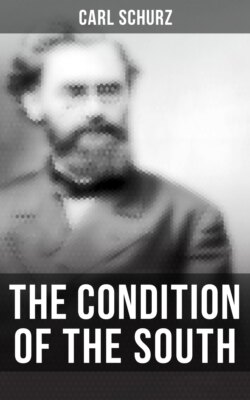Читать книгу The Condition of the South - Schurz Carl - Страница 7
На сайте Литреса книга снята с продажи.
FEELING TOWARDS THE SOLDIERS AND THE PEOPLE OF THE NORTH.
ОглавлениеA more substantial evidence of "returning loyalty" would be a favorable change of feeling with regard to the government's friends and agents, and the people of the loyal States generally. I mentioned above that all organized attacks upon our military forces stationed in the south have ceased; but there are still localities where it is unsafe for a man wearing the federal uniform or known as an officer of the government to be abroad outside of the immediate reach of our garrisons. The shooting of single soldiers and government couriers was not unfrequently reported while I was in the south, and even as late as the middle of September, Major Miller, assistant adjutant general of the commissioner of the Freedmen's Bureau in Alabama, while on an inspecting tour in the southern counties of that State, found it difficult to prevent a collision between the menacing populace and his escort. His wagon-master was brutally murdered while remaining but a short distance behind the command. The murders of agents of the Freedmen's Bureau have been noticed in the public papers. These, and similar occurrences, however, may be looked upon as isolated cases, and ought to be charged, perhaps, only to the account of the lawless persons who committed them.
But no instance has come to my notice in which the people of a city or a rural district cordially fraternized with the army. Here and there the soldiers were welcomed as protectors against apprehended dangers; but general exhibitions of cordiality on the part of the population I have not heard of. There are, indeed, honorable individual exceptions to this rule. Many persons, mostly belonging to the first of the four classes above enumerated, are honestly striving to soften down the bitter feelings and traditional antipathies of their neighbors; others, who are acting more upon motives of policy than inclination, maintain pleasant relations with the officers of the government. But, upon the whole, the soldier of the Union is still looked upon as a stranger, an intruder—as the "Yankee," "the enemy." It would be superfluous to enumerate instances of insult offered to our soldiers, and even to officers high in command; the existence and intensity of this aversion is too well known to those who have served or are now serving in the south to require proof. In this matter the exceptions were, when I was there, not numerous enough to affect the rule. In the documents accompanying this report you will find allusions confirming this statement. I would invite special attention to the letter of General Kirby Smith, (accompanying document No. 9.)
This feeling of aversion and resentment with regard to our soldiers may, perhaps, be called natural. The animosities inflamed by a four years' war, and its distressing incidents, cannot be easily overcome. But they extend beyond the limits of the army, to the people of the north. I have read in southern papers bitter complaints about the unfriendly spirit exhibited by the northern people—complaints not unfrequently flavored with an admixture of vigorous vituperation. But, as far as my experience goes, the "unfriendly spirit" exhibited in the north is all mildness and affection compared with the popular temper which in the south vents itself in a variety of ways and on all possible occasions. No observing northern man can come into contact with the different classes composing southern society without noticing it. He may be received in social circles with great politeness, even with apparent cordiality; but soon he will become aware that, although he may be esteemed as a man, he is detested as a "Yankee," and, as the conversation becomes a little more confidential and throws off ordinary restraint, he is not unfrequently told so; the word "Yankee" still signifies to them those traits of character which the southern press has been so long in the habit of attributing to the northern people; and whenever they look around them upon the traces of the war, they see in them, not the consequences of their own folly, but the evidences of "Yankee wickedness." In making these general statements, I beg to be understood as always excluding the individual exceptions above mentioned.
It is by no means surprising that prejudices and resentments, which for years were so assiduously cultivated and so violently inflamed, should not have been turned into affection by a defeat; nor are they likely to disappear as long as the southern people continue to brood over their losses and misfortunes. They will gradually subside when those who entertain them cut resolutely loose from the past and embark in a career of new activity on a common field with those whom they have so long considered their enemies. Of this I shall say more in another part of this report. But while we are certainly inclined to put upon such things the most charitable construction, it remains nevertheless true, that as long as these feelings exist in their present strength, they will hinder the growth of that reliable kind of loyalty which springs from the heart and clings to the country in good and evil fortune.
